Assembly of the Republic (Portugal)
The Assembly of the Republic (Portuguese: Assembleia da República, pronounced [ɐsẽˈblɐjɐ dɐ ʁɛˈpublikɐ]) is the parliament of Portugal. According to the Constitution of Portugal, the unicameral parliament "is the representative assembly of all Portuguese citizens." The constitution names the assembly as one of the country's organs of supreme authority.
Assembly of the Republic Assembleia da República | |
|---|---|
| 14th Assembly of the Republic | |
 Emblem of the Assembly of the Republic | |
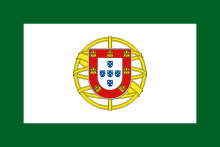 Flag of the Assembly of the Republic | |
| Type | |
| Type | |
| Leadership | |
Vice-Presidents | |
| Structure | |
| Seats | 230 |
.svg.png) | |
Political groups | Government (108)
Opposition (122) |
| Elections | |
| Party-list proportional representation D'Hondt method Closed list | |
Last election | 6 October 2019 |
Next election | 8 October 2023 or earlier |
| Meeting place | |
_S%C3%A3o_Bento.jpg) | |
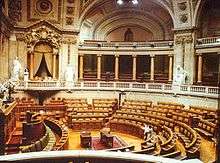 | |
| São Bento Palace, Lisbon, Portugal | |
| Website | |
| parlamento | |
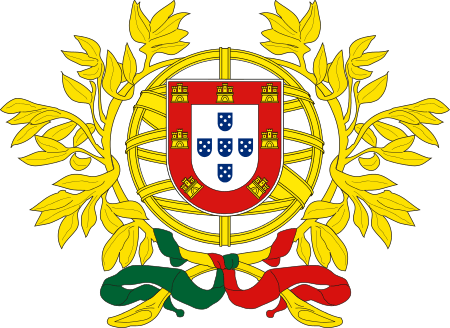 |
|---|
| This article is part of a series on the politics and government of Portugal |
| Constitution |
|
|
Legislature
|
|
|
|
It is located in a historical building in Lisbon, referred to as Palácio de São Bento (Palace of Saint Benedict), the site of an old Benedictine monastery. The Palácio de São Bento has been the seat of the Portuguese parliaments since 1834 (Cortes until 1910, Congress from 1911 to 1926 and National Assembly from 1933 to 1974).
Powers and duties of the Assembly
The Assembly of the Republic's powers derives from its power to dismiss a government through a vote of no confidence, to change the country's laws, and to amend the constitution (this one requires a majority of two-thirds). In addition to these key powers, the constitution grants to the Assembly extensive legislative powers and substantial control over the budget, the right to authorize the government to raise taxes and grant loans, the power to ratify treaties and other kinds of international agreements, and the duty to approve or reject decisions by the President of the Republic to declare war and make peace. The assembly also appoints many members of important state institutions, such as ten of the thirteen members of the Constitutional Court and seven of the sixteen members of the Council of State.
The constitution requires the assembly to quickly review and approve an incoming government's program. Parliamentary rules allow the assembly to call for committees of inquiry to examine the government's actions. Political opposition represented in the assembly has the power to review the cabinet's actions, even though it is unlikely that the actions can be reversed. Party groups can also call for interpellations that require debates about specific government policies.
Structure
The assembly consisted at first of 250 members, but the constitutional reforms of 1989 reduced its number to between 180 and 230. Members are elected by popular vote for legislative terms of four years from the country's twenty-two constituencies (eighteen in mainland Portugal corresponding to each district, one for each autonomous region, Azores (Portuguese: Açores) and Madeira, one for Portuguese living in Europe and a last one for those living in the rest of the world. Except for the constituencies for Portuguese living abroad, which are fixed at two members each, the number of voters registered in a constituency determines the number of its members in the assembly, using the D'Hondt method of proportional representation. Constituencies vary greatly in size; from as large as the district of Lisbon, which returns 48 representatives, to as small as the district of Portalegre, which elects just two.
For the 2019 legislative elections, the MPs distributed by districts were as follows:[3]
| District | Number of MPs | Map |
|---|---|---|
| Lisbon | 48 | 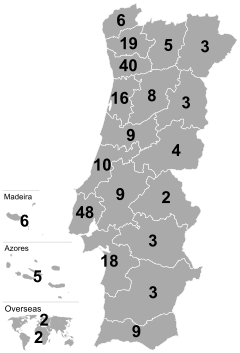 |
| Porto | 40 | |
| Braga | 19 | |
| Setúbal | 18 | |
| Aveiro | 16 | |
| Leiria | 10 | |
| Coimbra, Faro and Santarém | 9 each | |
| Viseu | 8 | |
| Madeira and Viana do Castelo | 6 each | |
| Azores and Vila Real | 5 each | |
| Guarda and Castelo Branco | 4 each | |
| Beja, Bragança, Évora e Guarda | 3 each | |
| Portalegre, Europe and Outside Europe | 2 each |
According to the constitution, members of the assembly represent the entire country, not the constituency from which they are elected. This directive has been reinforced in practice by the strong role of political parties in regard to members of the assembly. Party leadership, for example, determines in which areas candidates are to run for office, thus often weakening members' ties to their constituencies. Moreover, members of the assembly are expected to vote with their party and to work within parliamentary groups based on party membership. Party discipline is strong, and insubordinate members can be coerced through a variety of means. A further obstacle to members' independence is that their bills first have to be submitted to the parliamentary groups, and it is these groups' leaders who set the assembly's agenda.
The President of the Assembly of the Republic is the second hierarchical figure in the Portuguese state, after the President of the Portuguese Republic, and is elected by secret vote of the members of parliament. The President of the Assembly is aided by four vice-presidents, nominated by the other parties represented in the parliament, and is usually the speaker. When he is not present, one of the vice-presidents takes the role of speaker. When the President of the Republic is, for any reason, unable to perform to job, the President of the Assembly of the Republic becomes his substitute.
Current composition
| Party | Caucus leader | Seats | % | |
|---|---|---|---|---|
| Socialist Party | Ana Catarina Mendes | 108 | 47.0 | |
| Social Democratic Party | Rui Rio | 79 | 34.4 | |
| Left Bloc | Pedro Filipe Soares | 19 | 8.2 | |
| Portuguese Communist Party | João Oliveira | 10 | 4.4 | |
| People's Party | Telmo Correia | 5 | 2.2 | |
| People–Animals–Nature | Inês Sousa Real | 3 | 1.3 | |
| Ecologist Party "The Greens" | José Luís Ferreira | 2 | 0.9 | |
| CHEGA | André Ventura | 1 | 0.4 | |
| Liberal Initiative | João Cotrim de Figueiredo | 1 | 0.4 | |
| Independent | Joacine Katar Moreira Cristina Rodrigues |
2 | 0.8 | |
| Total | 230 | 100.0 | ||
Latest election
National summary
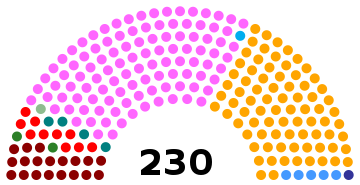 | |||||||||||||||
| Parties | Votes | % | ±pp swing | MPs | MPs %/ votes % | ||||||||||
|---|---|---|---|---|---|---|---|---|---|---|---|---|---|---|---|
| 2015 | 2019 | ± | % | ± | |||||||||||
| Socialist | 1,903,687 | 36.35 | 86 | 108 | 46.96 | 1.29 | |||||||||
| Social Democratic | 1,454,283 | 27.77 | [lower-alpha 1] | 89 | 79 | 34.35 | 1.24 | ||||||||
| Left Bloc | 498,549 | 9.52 | 19 | 19 | 8.26 | 0.87 | |||||||||
| Unitary Democratic Coalition | 332,018 | 6.34 | 17 | 12 | 5.22 | 0.82 | |||||||||
| People's | 221,094 | 4.22 | [lower-alpha 1] | 18 | 5 | 2.17 | 0.51 | ||||||||
| People–Animals–Nature | 173,931 | 3.32 | 1 | 4 | 1.74 | 0.52 | |||||||||
| CHEGA | 67,502 | 1.29 | N/A | N/A | 1 | N/A | 0.43 | N/A | 0.33 | ||||||
| Liberal Initiative | 67,443 | 1.29 | N/A | N/A | 1 | N/A | 0.43 | N/A | 0.33 | ||||||
| LIVRE | 56,940 | 1.09 | 0 | 1 | 0.43 | 0.39 | |||||||||
| Alliance | 40,175 | 0.77 | N/A | N/A | 0 | N/A | 0.00 | N/A | 0.0 | ||||||
| Portuguese Workers' Communist | 36,006 | 0.69 | 0 | 0 | 0.00 | 0.0 | |||||||||
| React, Include, Recycle | 35,169 | 0.67 | N/A | N/A | 0 | N/A | 0.00 | N/A | 0.0 | ||||||
| National Renovator | 16,992 | 0.32 | 0 | 0 | 0.00 | 0.0 | |||||||||
| Earth | 12,888 | 0.25 | 0 | 0 | 0.00 | 0.0 | |||||||||
| We, the Citizens! | 12,346 | 0.24 | 0 | 0 | 0.00 | 0.0 | |||||||||
| Democratic Republican | 11,674 | 0.22 | 0 | 0 | 0.00 | 0.0 | |||||||||
| United Party of Retirees and Pensioners | 11,457 | 0.22 | 0 | 0 | 0.00 | 0.0 | |||||||||
| Together for the People | 10,552 | 0.20 | 0 | 0 | 0.00 | 0.0 | |||||||||
| People's Monarchist | 8,389 | 0.16 | 0 | 0 | 0.00 | 0.0 | |||||||||
| Labour | 8,271 | 0.16 | [lower-alpha 2] | 0 | 0 | 0.00 | 0.0 | ||||||||
| Socialist Alternative Movement | 3,243 | 0.06 | [lower-alpha 2] | 0 | 0 | 0.00 | 0.0 | ||||||||
| Total valid | 4,982,609 | 95.14 | 230 | 230 | 100.00 | — | |||||||||
| Blank ballots | 131,302 | 2.51 | |||||||||||||
| Invalid ballots | 123,573 | 2.36 | |||||||||||||
| Total | 5,237,484 | 100.00 | |||||||||||||
| Registered voters/turnout | 10,777,258 | 48.60 | |||||||||||||
| Source: Comissão Nacional de Eleições | |||||||||||||||
Distribution by constituency
| Constituency | % | S | % | S | % | S | % | S | % | S | % | S | % | S | % | S | % | S | Total S |
|---|---|---|---|---|---|---|---|---|---|---|---|---|---|---|---|---|---|---|---|
| PS | PSD | BE | CDU | CDS–PP | PAN | CH | IL | L | |||||||||||
| Azores | 40.1 | 3 | 30.2 | 2 | 8.0 | - | 2.5 | - | 4.8 | - | 2.7 | - | 0.9 | - | 0.7 | - | 0.9 | - | 5 |
| Aveiro | 34.3 | 7 | 33.6 | 6 | 10.0 | 2 | 3.1 | - | 5.7 | 1 | 3.0 | - | 0.7 | - | 1.0 | - | 0.7 | - | 16 |
| Beja | 40.7 | 2 | 13.3 | - | 9.1 | - | 22.8 | 1 | 2.3 | - | 2.0 | - | 2.0 | - | 0.4 | - | 0.6 | - | 3 |
| Braga | 36.4 | 8 | 34.1 | 8 | 8.9 | 2 | 4.0 | - | 4.1 | 1 | 2.6 | - | 0.7 | - | 0.8 | - | 0.7 | - | 19 |
| Bragança | 36.5 | 1 | 40.8 | 2 | 6.0 | - | 2.1 | - | 4.5 | - | 1.3 | - | 0.8 | - | 0.4 | - | 0.3 | - | 3 |
| Castelo Branco | 40.9 | 3 | 26.3 | 1 | 11.1 | - | 4.8 | - | 3.7 | - | 2.4 | - | 1.3 | - | 0.6 | - | 0.9 | - | 4 |
| Coimbra | 39.0 | 5 | 26.6 | 3 | 11.2 | 1 | 5.6 | - | 3.5 | - | 2.6 | - | 0.9 | - | 0.8 | - | 0.9 | - | 9 |
| Évora | 38.3 | 2 | 17.5 | - | 9.0 | - | 18.9 | 1 | 3.4 | - | 2.0 | - | 2.2 | - | 0.7 | - | 0.7 | - | 3 |
| Faro | 36.8 | 5 | 22.3 | 3 | 12.3 | 1 | 7.1 | - | 3.8 | - | 4.8 | - | 2.1 | - | 0.8 | - | 1.0 | - | 9 |
| Guarda | 37.6 | 2 | 34.3 | 1 | 7.8 | - | 3.0 | - | 5.0 | - | 1.6 | - | 1.5 | - | 0.6 | - | 0.5 | - | 3 |
| Leiria | 31.1 | 4 | 33.5 | 5 | 9.4 | 1 | 4.3 | - | 5.3 | - | 2.9 | - | 1.5 | - | 0.9 | - | 0.9 | - | 10 |
| Lisbon | 36.7 | 20 | 22.6 | 12 | 9.7 | 5 | 7.8 | 4 | 4.4 | 2 | 4.4 | 2 | 2.0 | 1 | 2.5 | 1 | 2.1 | 1 | 48 |
| Madeira | 33.4 | 3 | 37.1 | 3 | 5.2 | - | 2.1 | - | 6.1 | - | 1.8 | - | 0.7 | - | 0.7 | - | 0.4 | - | 6 |
| Portalegre | 44.7 | 2 | 20.1 | - | 10.5 | - | 8.1 | - | 3.8 | - | 1.7 | - | 2.7 | - | 0.5 | - | 0.6 | - | 2 |
| Porto | 36.7 | 17 | 31.2 | 15 | 10.1 | 4 | 4.8 | 2 | 3.3 | 1 | 3.5 | 1 | 0.6 | - | 1.5 | - | 1.0 | - | 40 |
| Santarém | 37.1 | 4 | 25.2 | 3 | 10.2 | 1 | 7.6 | 1 | 4.7 | - | 2.6 | - | 2.0 | - | 0.8 | - | 0.9 | - | 9 |
| Setúbal | 38.6 | 9 | 14.4 | 3 | 12.1 | 2 | 15.8 | 3 | 3.0 | - | 4.4 | 1 | 1.9 | - | 1.1 | - | 1.2 | - | 18 |
| Viana do Castelo | 34.8 | 3 | 33.8 | 3 | 8.5 | - | 4.0 | - | 6.2 | - | 2.4 | - | 0.7 | - | 0.6 | - | 0.6 | - | 6 |
| Vila Real | 37.2 | 2 | 39.0 | 3 | 6.1 | - | 2.5 | - | 4.5 | - | 1.7 | - | 0.8 | - | 0.4 | - | 0.6 | - | 5 |
| Viseu | 35.4 | 4 | 36.2 | 4 | 7.9 | - | 2.3 | - | 5.9 | - | 2.1 | - | 1.0 | - | 0.6 | - | 0.5 | - | 8 |
| Europe | 29.1 | 1 | 18.8 | 1 | 5.7 | - | 2.5 | - | 3.0 | - | 4.9 | - | 0.9 | - | 0.8 | - | 1.1 | - | 2 |
| Rest of the World | 20.2 | 1 | 33.4 | 1 | 3.5 | - | 1.0 | - | 4.7 | - | 4.3 | - | 0.9 | - | 2.5 | - | 0.7 | - | 2 |
| Total | 36.4 | 108 | 27.8 | 79 | 9.5 | 19 | 6.3 | 12 | 4.2 | 5 | 3.3 | 4 | 1.3 | 1 | 1.3 | 1 | 1.1 | 1 | 230 |
| Source: Comissão Nacional de Eleições | |||||||||||||||||||
Composition of the Assembly of the Republic since 1975
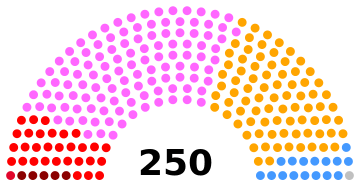
1975-1976 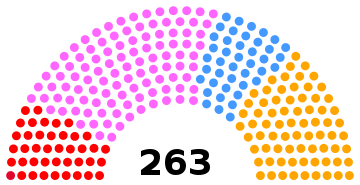
1976-1979 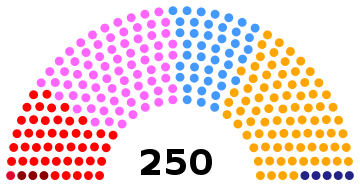
1979-1980 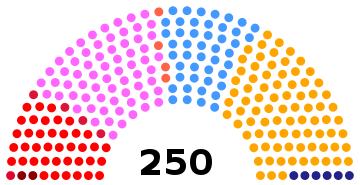
1980-1983 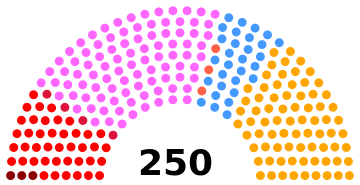
1983-1985 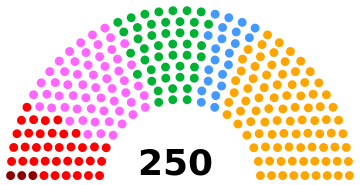
1985-1987 
1987-1991 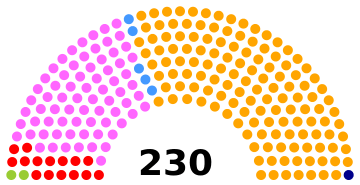
1991-1995 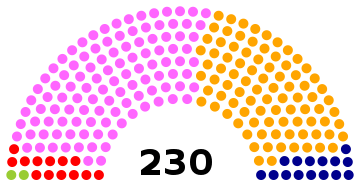
1995-1999 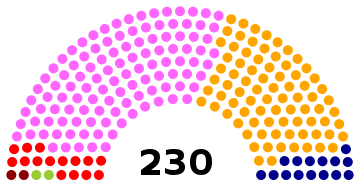
1999-2002 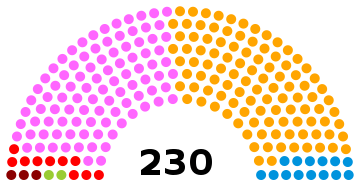
2002-2005 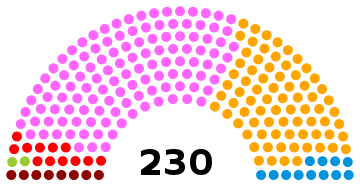
2005-2009 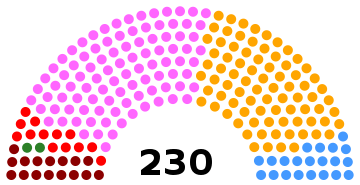
2009-2011 
2011-2015 
2015–2019 
2019–2023
Presidents of the Assembly of the Republic
Members
See also
- São Bento Palace
- ARtv (Portugal)
Notes
- The Social Democratic Party (PSD) and the People's Party (CDS–PP) contested the 2015 election in a coalition called Portugal Ahead (PàF) and won a combined 38.6% of the vote and elected 107 MPs to parliament.
- The Socialist Alternative Movement (MAS) and the Portuguese Labour Party (PTP) contested the 2015 election in a coalition called AGIR! (Act!) and won a combined 0.4% of the vote.
References
- https://observador.pt/2020/01/31/assembleia-do-livre-retira-confianca-a-joacine-katar-moreira/
- "Cristina Rodrigues deixa PAN e passa a deputada não inscrita". Notícias ao Minuto (in Portuguese). 2020-06-25. Retrieved 2020-06-25.
- "Mapa Oficial nº 2-A 2015" (PDF). CNE - Comissão Nacional de Eleições - Diário da República, 1.a série—N.o 154-10 de agosto de 2015. Retrieved 20 January 2016.
External links
| Wikimedia Commons has media related to Assembly of the Republic (Portugal). |
.png)